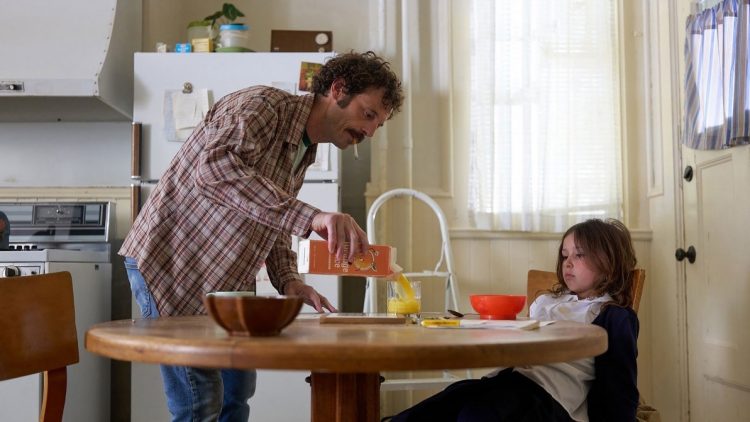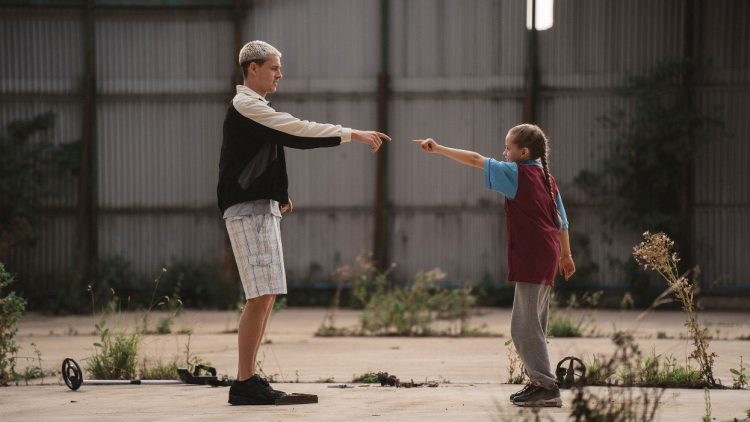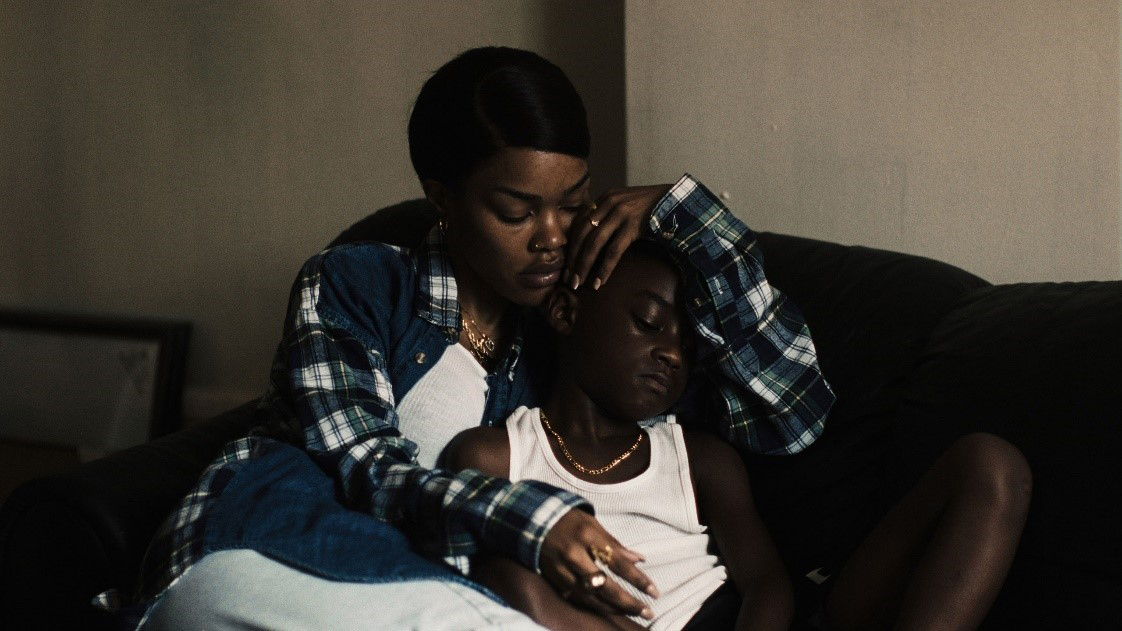Four feature-directorial debuts at this year’s Sundance Film Festivals interrogated dynamics of family – whether filial or parental – offering distinct social commentary while doing them. The four directors all perform dual duties as writers of their respective films. Although some were more successful than others, the films offer some compelling sociocultural dynamics in their accounts of building different types of families.
The most successful of the lot was A V Rockwell’s “A Thousand and One” a tale of motherhood and gentrification in the nineties, which won the Grand Jury Prize at the festival in the US Dramatic competition. Andrew Durham’s “Fairyland” moves back even further, from the seventies through the eighties, in a tale of queer fatherhood in San Francisco. Across the pond, Charlotte Regan’s “Scrapper”, is about a young girl living alone after her mother’s death when her very young, very inexperienced father disappeared. Noora Niasari’s “Shayda”, which tells a story of healing in the aftermath of domestic abuse, is about an Iranian immigrant struggling to take care of her daughter while trying to divorce her abusive husband.


There’s a sweeping lyricism to the tones and gradations in Rockwell’s “A Thousand and One”, the best fiction-feature premiere I saw at this year’s festival. It’s the kind of blistering, complicated, and seeking work that feels fraught with emotion and tensions that deserves to be seen by as wide an audience as possible.
“A Thousand and One” feels as much a story about family dynamics as what it means to be a Black woman in an unforgiving and uncompromising world. We first meet Inez (Teyanna Taylor), a woman in her early twenties, when she is recently released from jail, trying to carve out a space for herself in New York City. Inez is young, restless, angry, determined and very full of life. She seeks out her six-year-old son Terry, who is in foster care. Realising the
dynamics of being a convict in this world, she kidnaps him. She is certain she can make his life better than hers. From there, we follow Inez and Terry on what feels like a novelistic saga of more than a decade. We weave in and out of their lives, watching the way Inez must change with the world and how her son Terry (played by three actors at different stages of his life first Aaron Kingsley Adetola then Aven Courtney and finally Josiah Cross) thrives. As the years go by, Rockwell’s perspective expands from the specificity of this mother-son relationship to interrogate poorness in the decade, the relentless gentrification of the neighbourhood and the dynamics of being Black.
It is startling how “A Thousand and One” never feels felled by its wide scope or ambition. Instead, Rockwell carves out a film that feels decidedly like its own thing and in 2023 seems almost out of place. It’s jarring to recognise even as strides have been made in American cinema towards a more multi-ethnic approach to stardom, the landscape for low-budget and mid-budget Black cinema seems lost. “A Thousand and One” is in conversation with the Black textures of films like “Boyz n the Hood”, or “The Wood”, or “Love Jones”, or “Crooklyn”. Not so much in form or in tone and certainly not in genre, but in the way that Rockwell is so hyper-focused on telling Black stories without necessitating justification and era, without arguing for us to take a specific neat message from it. Instead, this film moves with a generosity and a perceptiveness that is explicitly aware of its period-sensibilities while also displaying a gentle grace in its backward-looking assessment. This is no bludgeon to the head kind of filmmaking but the kind of work where Eric K. Yue’s grainy cinematography takes on a life of its own, or Gary Gunn ‘s music delicately moves us through time-jumps that are never disorienting. And, how wonderful for Rockwell that the film is stabilised by a miraculous performance from Taylor, giving what might be the most engaging performance of the festival. It is stunningly layered work, and Taylor here feels like one that will linger for the rest of 2023. It is a performance of remarkable specificity and audaciousness with a closing shot that stays on her face – expressive, trenchant, complex and incredibly moving. Just like the film.
The parental dynamic in “Fairyland” is moving in parts in the same way that Rockwell excavates dynamics of love but the film around the performances feels less sure of itself and less engaging. The centre performance from a very naturalistic and relaxed Scoot McNairy makes the film feel essential even when its approach to its dramaturgy is sometimes inexact.
It is impossible to argue against the earnestness that suffuses the film, which is based on the memoirs of Alyssia Abbott. When her mother dies in an accident in 1973, young Alyssia (played by Nessa Dougherty and then later by Emilia Jones) moves with her father, Steve, to San Francisco. Steve is a poet, an activist and begins to openly date men. He is making up for lost time, it seems, and his bohemian approach to parenting sometimes finds Alyssia both beguiled and frustrated. As we head into the eighties, the dynamics of being a queer man in the worst decade for queer people arise in ways that are very telegraphed and very expected and “Fairyland” grapples with the meaning of parenthood and what it looks like to take care of those who should be taking care of us. The emotional resonance of the actual story is inarguable, even if the actual film of “Fairyland” is less convincing.
McNairy is excellent here, in a performance of open warmth and sincerity. McNairy has been one of the best under-the-radar actors whose best-in-show performance in 2012’s “Killing Them Softly” is the kind of work you expected to make him more of a main feature of the last decade of movies. “Fairyland” offers him his largest opportunity for vividness and he delivers with waves of sincerity. But it’s hard to ignore the ways that, even with a performance of some deep vividness, the way that Durham’s work seems to confuse a shaggy aesthetic with a too slipshod approach to dramaturgy. Too much of “Fairyland” is hazily formless in its structure, moving from scene to scene with an ambience that is too listless at times. It leaves the performers to carve out dramaturgical precision. The supporting cast weaving in and out of the story are left with little to play with including an underused Geena Davis as Alyssia’s maternal grandmother. The mid-film time-jump, which introduces Jones as an aged-up Alyssia offers potential for new dramatic conflicts which are engaging if not always fully developed. Jones tries her best, and is better towards the end, when the plot makes good on its weepy expectations, but “Fairyland” seems uncertain as to who is the centre of its story in its final act, a problem that is exacerbated because somewhere around ⅓ into it you realise exactly where it’s headed, and nothing feels energetic or sharp enough to make how it gets there feel indelible enough. And yet McNairy is excellent here in a performance that I hope convinces the world of his inimitable gift.
The ostensible similarities between “Fairyland” and Charlotte Regan’s “Scrapper” are striking, at first. In this film, a 12-year-old girl finds herself dealing with life after her mother’s sudden death and the appearance of a hitherto absent father. But “Scrapper” is a British quasi-comedy that is more coming-of-age than period saga.
When we see young Georgie in the opening sequences, she is living alone in her apartment and pretending to all adults around her that her uncle is staying with her as she grieves for her recently dead mother. There is no uncle and Georgie is living alone, a ruse she hopes to keep up and remain in the space where she and her mother have spent most of their lives. When a bleached-hair and not very mature Jason turns up, Georgie is sceptical of this man she has never met. Can he be a father to her? “Scrapper” does not go anywhere truly unexpected as the two navigate their new dynamics but what I find really compelling is its intrepid resistance to colouring this story into the miserablist or the gloomy as a way of feigning importance. It is incredibly clear-eyed about its circumstances and its stakes, neither turning its dynamics into something world-shifting or being too treacly in its deliberately childish point-of-view. Regan has enough trust in the smallness of her story and it’s so wonderful she doesn’t find herself trying to substantiate it with an aesthetic approach that’s counterintuitive to the ambivalence of these people.
In that ambivalence, Regan pulls a disarming performance from Campbell, who is just a bit too familiarly precocious at first but feels real and vivid by the end. “Scrapper” is firmly focussed on its coming-of-age narrative and so the film occasionally manifests itself into the form of an adolescent mind. It’s a sweet and charming way of engaging with the heavier themes here. And even though it means that “Scrapper” oftentimes feels less thorny and angry than it might be, it gives way to a warmth that is welcome and genuine and earned. Even better for Regan, she directs Harris Dickinson to an excellent performance. Dickinson’s debut performance as the very complicated Frankie in “Beach Rats” is miles away from the loose charm of Jason here and it’s a reminder that he’s fast becoming one of the best actors of his generation. His performance here, without a hint of performative moodiness, with very little yelling and more diffident than overt is the kind that young actors very rarely get recognised for. In Dickinson’s performance, and excellent chemistry with Campbell, I found myself thinking of my own ambivalence to 2022’s celebrated father-daughter tale “Aftersun”. It is likely that the easy warmth of “Scrapper” may make it appear as less indelible but in its easiness, I think “Scrapper” something more thoughtful and engaging and hopefully its Grand Jury Prize for the World Cinema Dramatic Competition means it will find a lasting audience this year.
Another film I hope finds a lasting audience is “Shayda” which presents a familiar, but still searing, look at the aftermath of domestic violence.
Like “Fairyland”, Niasari’s work is also bound to a story of memory based on a real-life account of the time a mother and daughter spend in a women’s shelter, trying to regroup after fleeing an abusive husband and father. “Shayda” develops a compelling approach to this all-too-familiar dynamic since it is not just a tale of domestic survival but also a transnational one. We are in the nineties in Australia and Shayda and her daughter are both Iranian immigrants. Shayda’s estranged husband (Hosein) has moved the family here while he studies. When we meet Shayda, she is already in the shelter, prioritising the film as one about her, her healing, and her relationship with her daughter Mona rather than one that insists on detailing incidence of abuse. It is a welcome choice that turns the film into one of gentle grace that finds itself navigating what it is like for a woman truly othered (in ethnicity, in nationality, in status) to carve out a new life for herself.
In many ways, “Shayda” does follow familiar beats. We watch her trepidation in finding her independence and the fraught moments with a falsely contrite Hosein pleading for them to return to him. Niasari’s direction prioritises the emotional more than the aesthetic so in some cases its visual language is often prosaic, but in that familiarity “Shayda” is reflective and thoughtful on the dynamics of immigration with the pockets of Iranian culture becoming a welcome respite for Shayda in her journey to self-actualisation. It all comes together at its gentle best in a plotless scene of little “importance” where various mothers in a shelter, their children and the shelter manager dance to a Farsi song on the television. No explicit plot motivation, no focus on the macro but a warm and tender scene of women all struggling reaching out for something like joy. It’s a moment like this which has me excited to see where Niasari’s career goes. It’s likely this empathy that made the film the winner of the Audience Award World – Cinema Dramatic Competition. The best moments of “Shayda” are built on a startling empathy that reveals itself in the excavating performances. The entire cast is compelling, especially Leah Purcell in a supporting role as a woman helping Shayda to find her confidence. But the lynchpin of “Shayda” is the woman at the centre.
And every moment of the film owes itself to the herculean performance of Zar Amir Ebrahimi at the centre in a decisive performance that’s both quiet and intense especially when the centre becomes slightly hazy as it moves towards its climaxes. On the heels of her superlative work in 2022’s “Holy Spider ‘’ as a fearless journalist, Ebrahimi’s work in “Shayda” is a contrast to remind us of her impressive range. This is the kind of performance that should convince the world that Ebrahimi should be considered as one of the finer talents of her generation. In “Shayda” she is finding depth and nuances and carving out a performance that turns every implicit idea in Niasari’s script into something that feels overwhelming and enduring.











